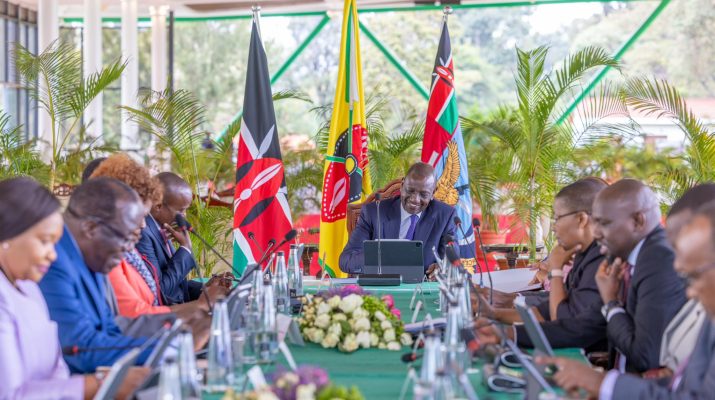By Grace Gilo
President William Ruto chaired a Cabinet meeting at State House in Nairobi on Tuesday, during which significant policy decisions were made across key sectors, including health, infrastructure, energy and youth empowerment.
A major highlight of the meeting was the endorsement of the Quality Healthcare and Patient Safety Bill, 2025. This legislation aims to transform the health sector by eliminating entrenched impunity and malpractices.
“The Bill seeks to eliminate systemic fraud, regulatory loopholes, and conflicts of interest that have long undermined healthcare delivery and public trust. It responds to glaring gaps that have allowed unqualified and fraudulent health facilities to be licensed and to operate,” read the statement in part from the cabinet meeting.
The Cabinet members further noted that the failures in the health system directly resulted from these weaknesses.
“The new Bill establishes a unified quality assurance framework and introduces strict mandatory licensing, registration, and accreditation for all health facilities, labs, and ambulance services,” stated the report from State House.
The legislation would also create a powerful Quality Healthcare and Patient Safety Authority, responsible for enforcing national care standards, overseeing implementation and monitoring performance.
“The proposed law introduces quality improvement plans at the facility level, enforces patient rights and sets clear criteria for emergency medical services, as the government aims to finally tackle the root causes of health sector corruption, protect patients and deliver safe, effective, and high-standard healthcare that universal health coverage pledges,” added the Cabinet members.
To achieve these goals, the Bill will implement a quality assurance framework, mandate rigorous licensing and accreditation for all health institutions and establish an independent Quality Healthcare and Patient Safety Authority.
This organisation will enforce standards, protect patient rights and enhance accountability across the sector.
Additionally, the Cabinet approved recommendations from the Presidential Task Force on Religious Organizations, marking a significant step in safeguarding the integrity of religious practices while curbing exploitation.
The proposed reforms, developed in response to the Shakahola tragedy, place religious leaders at the centre of accountability efforts and emphasize self-regulation over state control.
Key proposals include enacting a legal framework to govern religious organisations, establishing a Religious Affairs Commission, and strengthening umbrella faith organisations for coordination.
The model blends institutional autonomy with supportive oversight and calls for leadership standards, reforms to religious broadcasting and civic education to promote tolerance and prevent extremism.
A multi-agency collaboration involving security agencies, interfaith platforms and educational institutions will support implementation.
To address pending bills, the Cabinet also approved further measures to accelerate momentum in the roads sector.
“This builds on the successful rollout of the road financing policy through the securitisation of the Road Maintenance Levy Fund (RMLF), which has already disbursed KSh64.2 billion, settling 40% of verified contractor claims of 575 contracts covering 393 projects,” said the Cabinet members.
To strengthen this innovative model of infrastructure development, the Cabinet approved an additional payment of up to 40%, bringing the total settlement to 80%, on the condition that contractors extend the final payment deadline by another 120 days.
“These measures have resolved long-standing financial obligations, unlocked stalled projects, improved contractor cash flow and ensured continuity in infrastructure development nationwide,” read the statement.

